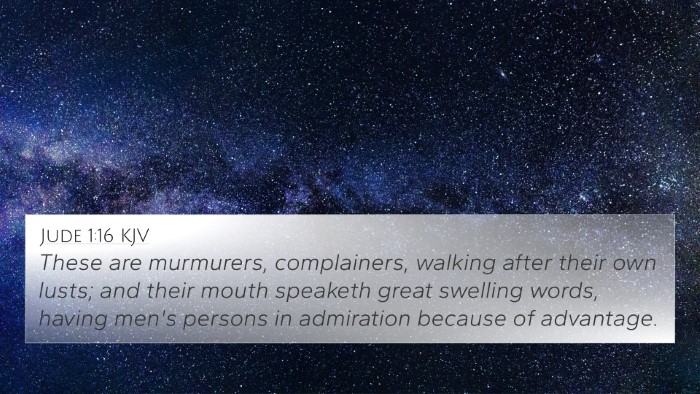Old Testament
Genesis Exodus Leviticus Numbers Deuteronomy Joshua Judges Ruth 1 Samuel 2 Samuel 1 Kings 2 Kings 1 Chronicles 2 Chronicles Ezra Nehemiah Esther Job Psalms Proverbs Ecclesiastes Song of Solomon Isaiah Jeremiah Lamentations Ezekiel Daniel Hosea Joel Amos Obadiah Jonah Micah Nahum Habakkuk Zephaniah Haggai Zechariah MalachiActs 24:2 Similar Verses
Acts 24:2 Cross References
And when he was called forth, Tertullus began to accuse him, saying, Seeing that by thee we enjoy great quietness, and that very worthy deeds are done unto this nation by thy providence,
Uncover the Rich Themes and Topics of This Bible Verse
Listed below are the Bible themes associated with Acts 24:2. We invite you to explore each theme to gain deeper insights into the Scriptures.
Acts 24:2 Cross Reference Verses
This section features a detailed cross-reference designed to enrich your understanding of the Scriptures. Below, you will find carefully selected verses that echo the themes and teachings related to Acts 24:2 KJV. Click on any image to explore detailed analyses of related Bible verses and uncover deeper theological insights.

Psalms 10:3 (KJV) »
For the wicked boasteth of his heart's desire, and blesseth the covetous, whom the LORD abhorreth.

Psalms 12:2 (KJV) »
They speak vanity every one with his neighbour: with flattering lips and with a double heart do they speak.

Proverbs 26:28 (KJV) »
A lying tongue hateth those that are afflicted by it; and a flattering mouth worketh ruin.

Acts 24:26 (KJV) »
He hoped also that money should have been given him of Paul, that he might loose him: wherefore he sent for him the oftener, and communed with him.

Jude 1:16 (KJV) »
These are murmurers, complainers, walking after their own lusts; and their mouth speaketh great swelling words, having men's persons in admiration because of advantage.
Acts 24:2 Verse Analysis and Similar Verses
Understanding Acts 24:2
Acts 24:2 reads: "And when he was called forth, Tertullus began to accuse him, saying, 'Seeing that by thee we enjoy great quietness, and that very worthy deeds are done unto this nation by thy providence.'" This verse presents a moment of legal accusation against the Apostle Paul, illustrating crucial themes of advocacy, governance, and testimony within the early Church.
Contextual Overview
This verse occurs during Paul's trial in front of Felix, the governor of Judea, indicating the tension and conflict present in the early Christian church. Tertullus speaks on behalf of the Jewish leaders, showing the role of oratory and defense in judicial matters of the time. The speeches in this trial reveal the social and political dynamics of the era.
Commentary Insights
Matthew Henry's Commentary
Matthew Henry emphasizes the importance of Tertullus' flattering speech. He notes that it was common for advocates to praise the governor unusually to gain favor. This reveals a deeper issue: the manipulation inherent in the political systems of the day. Henry suggests this not only mirrors contemporary legal practices but also serves as a warning against falsehood in testimony.
Albert Barnes' Notes
Albert Barnes highlights the phrase "by thee we enjoy great quietness." He suggests that Tertullus' flattery underscores a broader historical ignorance—namely, that while Felix had a troubled governing record, the Jewish leaders exploited the current peace for their advantage. Barnes points out that political leaders are often depicted in conflicting lights within scriptures, warning about the reliability of such public claims.
Adam Clarke's Commentary
Adam Clarke notes that Tertullus' introduction invokes Felix’s supposed contributions to peace in Judea. He examines the intention behind Tertullus' words, arguing that they mask underlying motives of jealousy and fear among the Jewish leaders regarding Paul’s influence. Clarke stresses that this aspect illustrates the complexity of human motives in conflict situations and the divine oversight present in such trials.
Thematic Connections
Acts 24:2 invites readers to explore several vital themes—truth versus flattery, justice versus manipulation, and the role of church leaders in societal disputes. This passage connects with various other Bible verses, enriching our understanding through cross-referencing.
- Proverbs 26:28: "A lying tongue hates its victims, and a flattering mouth works ruin." This verse resonates with the nature of Tertullus' flattery in Acts 24:2.
- Jeremiah 9:5: "...they speak idly, everyone speaks deceitfully to his neighbor..." Signifying the pervasive nature of deceit in human interactions.
- Luke 12:2: "For there is nothing covered that will not be revealed, nor hidden that will not be known." Reflecting the ultimate truth that deception is transient.
- Acts 23:30: "And when it was told me how that the Jews laid wait for the man, I sent straightway to thee..." Paul’s previous encounters illustrate the ever-present danger and plotting against him.
- Romans 13:1: "Let every soul be subject unto the higher powers..." Relating to the role of governance and authority in both secular and spiritual matters.
- 1 Peter 2:12: "Having your conversation honest among the Gentiles..." This speaks toward the Christian conduct amidst societal scrutiny, in parallel to Paul's trial.
- Matthew 10:18: "And ye shall be brought before governors and kings for my sake..." Reflecting on the nature of Christian witness in the face of political authority.
Conclusion
Acts 24:2 serves as a vital point of reflection on the nature of truthfulness within advocacy, the manipulation of political discourse, and the necessity for discernment among believers. By examining this verse alongside other biblical texts, we uncover a rich tapestry of interrelated themes that challenge and enlighten us in our spiritual walk.



